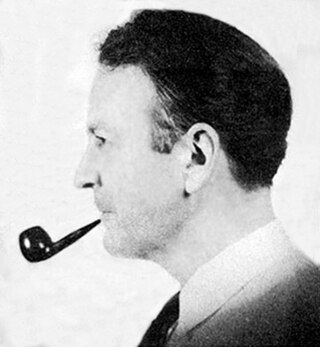
Raymond Thornton Chandler was an American-British novelist and screenwriter. In 1932, at the age of forty-four, Chandler became a detective fiction writer after losing his job as an oil company executive during the Great Depression. His first short story, "Blackmailers Don't Shoot", was published in 1933 in Black Mask, a popular pulp magazine. His first novel, The Big Sleep, was published in 1939. In addition to his short stories, Chandler published seven novels during his lifetime. All but Playback have been made into motion pictures, some more than once. In the year before his death, he was elected president of the Mystery Writers of America.

The Big Sleep (1939) is a hardboiled crime novel by American-British writer Raymond Chandler, the first to feature the detective Philip Marlowe. It has been adapted for film twice, in 1946 and again in 1978. The story is set in Los Angeles.
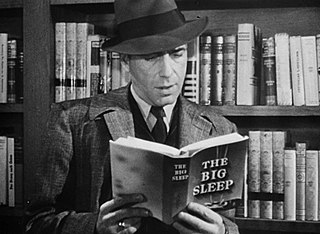
Philip Marlowe is a fictional character created by Raymond Chandler who was characteristic of the hardboiled crime fiction genre. The genre originated in the 1920s, notably in Black Mask magazine, in which Dashiell Hammett's The Continental Op and Sam Spade first appeared. Marlowe first appeared under that name in The Big Sleep, published in 1939. Chandler's early short stories, published in pulp magazines such as Black Mask and Dime Detective, featured similar characters with names like "Carmady" and "John Dalmas", starting in 1933.
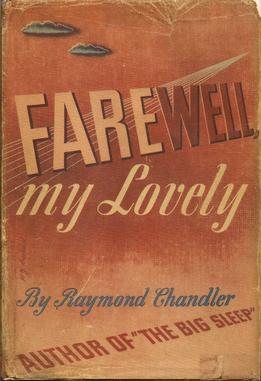
Farewell, My Lovely is a novel by Raymond Chandler, published in 1940, the second novel he wrote featuring the Los Angeles private eye Philip Marlowe. It was adapted for the screen three times and was also adapted for the stage and radio.
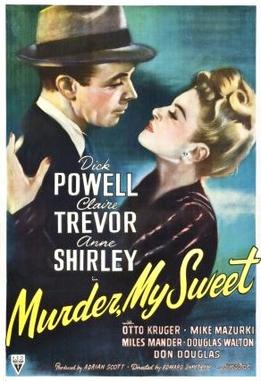
Murder, My Sweet is a 1944 American film noir, directed by Edward Dmytryk and starring Dick Powell, Claire Trevor and Anne Shirley. The film is based on Raymond Chandler's 1940 novel Farewell, My Lovely. It was the first film to feature Chandler's primary character, the hard-boiled private detective Philip Marlowe.

Telefon is a 1977 spy film directed by Don Siegel and starring Charles Bronson, Lee Remick and Donald Pleasence. The screenplay by Peter Hyams and Stirling Silliphant is based on the 1975 novel by Walter Wager.

The Lady in the Lake is a 1943 detective novel by Raymond Chandler featuring the Los Angeles private investigator Philip Marlowe. Notable for its removal of Marlowe from his usual Los Angeles environs for much of the book, the novel's complicated plot initially deals with the case of a missing woman in a small mountain town some 80 miles (130 km) from the city. The book was written shortly after the attack on Pearl Harbor and makes several references to America's recent involvement in World War II.

Playback is a novel by American-British writer Raymond Chandler featuring the private detective Philip Marlowe. It was first published in Britain in July 1958; the US edition followed in October that year. Chandler died the following year; Playback is his last completed novel.

The Big Sleep is a 1946 American film noir directed by Howard Hawks. William Faulkner, Leigh Brackett and Jules Furthman co-wrote the screenplay, which adapts Raymond Chandler's 1939 novel. The film stars Humphrey Bogart as private detective Philip Marlowe and Lauren Bacall as Vivian Rutledge in a story that begins with blackmail and leads to multiple murders.
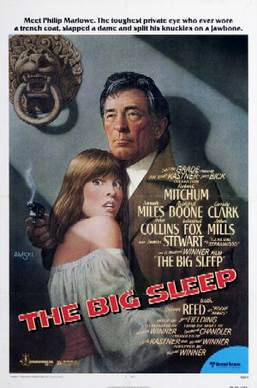
The Big Sleep is a 1978 neo-noir film, the second film version of Raymond Chandler's 1939 novel of the same name. The picture was directed by Michael Winner and stars Robert Mitchum in his second film portrayal of the detective Philip Marlowe. The cast includes Sarah Miles, Candy Clark, Joan Collins and Oliver Reed, and features James Stewart as General Sternwood.
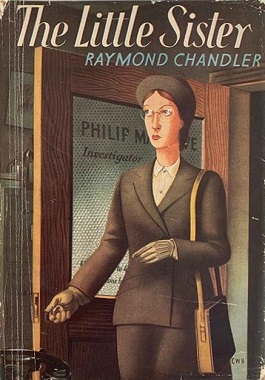
The Little Sister is a 1949 novel by Raymond Chandler, his fifth featuring the private investigator Philip Marlowe. The story is set in Los Angeles in the late 1940s and follows Marlowe's investigation of a missing persons case and blackmail scheme centered around a Hollywood starlet. With several scenes involving the film industry, the novel was partly inspired by Chandler's experience working as a screenwriter in Hollywood and his low opinion of the industry and most of the people in it. The book was first published in the UK in June 1949 and was released in the United States three months later.
Stirling Dale Silliphant was an American screenwriter and producer. He is best remembered for his screenplay for In the Heat of the Night, for which he won an Academy Award in 1967, and for creating the television series Naked City, Perry Mason, and Route 66. Other features as screenwriter include the Irwin Allen productions The Towering Inferno and The Poseidon Adventure.
Paul Bogart was an American television director and producer. Bogart directed episodes of the television series 'Way Out in 1961, Coronet Blue in 1967, Get Smart, The Dumplings in 1976, All In The Family from 1975 to 1979, Mama Malone in 1982, and four episodes of the first season of The Golden Girls in 1985. Among his films are Oh, God! You Devil, Torch Song Trilogy, Halls of Anger, Marlowe, Skin Game, and Class of '44. He won five Primetime Emmy Awards during his long career, from sixteen nominations. In 1991, he was awarded the French Festival Internationelle Programmes Audiovisuelle at the Cannes Film Festival.
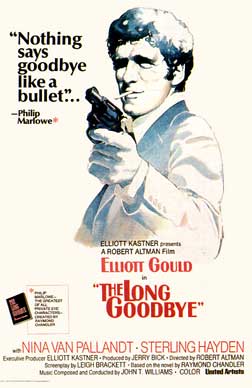
The Long Goodbye is a 1973 American satirical neo-noir film directed by Robert Altman and written by Leigh Brackett, based on Raymond Chandler's 1953 novel. The film stars Elliott Gould as Philip Marlowe and features Sterling Hayden, Nina Van Pallandt, Jim Bouton, Mark Rydell, and an early, uncredited appearance by Arnold Schwarzenegger.
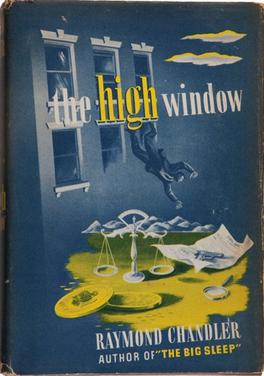
The High Window is a 1942 novel written by Raymond Chandler. It is his third novel featuring the Los Angeles private detective Philip Marlowe.
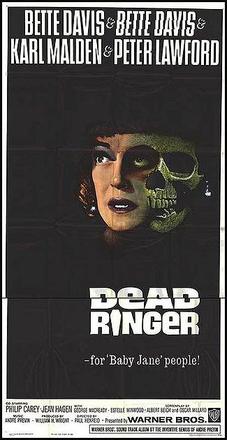
Dead Ringer is a 1964 American psychological thriller made by Warner Bros. It was directed by Paul Henreid from a screenplay by Oscar Millard and Albert Beich, from the story La Otra by Rian James, previously filmed in a Mexican version starring Dolores del Río. The soundtrack is by André Previn and the cinematography by Ernest Haller. The film stars Bette Davis, Karl Malden and Peter Lawford with Philip Carey, Jean Hagen, George Macready, Estelle Winwood, George Chandler and Cyril Delevanti.
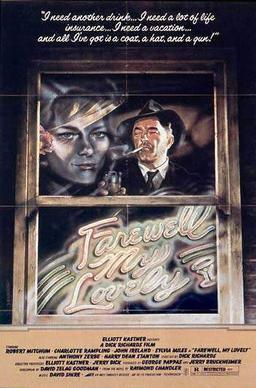
Farewell, My Lovely is a 1975 American neo-noir crime thriller film directed by Dick Richards and featuring Robert Mitchum as private detective Philip Marlowe. The picture is based on Raymond Chandler's novel Farewell, My Lovely (1940), which had previously been adapted for film as Murder, My Sweet in 1944. The supporting cast features Charlotte Rampling, John Ireland, Jack O'Halloran, Sylvia Miles, Harry Dean Stanton and hardcore crime novelist Jim Thompson, in his only acting role, as Charlotte Rampling's character's elderly husband Judge Grayle. Mitchum returned to the role of Marlowe three years later in the 1978 film The Big Sleep, making him the only actor to portray the character more than once in a feature film.

Dolores Jean Moran was an American film actress and model.

The Falcon Takes Over, is a 1942 black-and-white mystery film directed by Irving Reis. The B film was the third, following The Gay Falcon and A Date with the Falcon (1941), to star George Sanders as the character Gay Lawrence, a gentleman detective known by the sobriquet the Falcon.

Maracaibo is a 1958 American drama film directed by Cornel Wilde and written by Ted Sherdeman. The film stars Cornel Wilde, Jean Wallace, Abbe Lane, Francis Lederer, Michael Landon and Joe E. Ross. The film was released on May 21, 1958, by Paramount Pictures.


















